$1.4 Trillion Spending Package Signed Into Law By President Trump Sees Bipartisan Results
January 3rd, 2020 by Global Down Syndrome Foundation
Funding Increases for the National Institutes of Health (NIH) and Down Syndrome Research Lauded by Global Down Syndrome Foundation
Photo by Marleen Van den Neste
Press Contacts:
Rejena Carmichael | rcarmichael@globaldownsyndrome.org | C: (240) 603-5494
Anca Call | acall@globaldownsyndrome.org | C: (720) 320-3832
December 22, 2019, Denver, CO– On Friday, President Trump signed a $1.4 trillion spending package that will fund the government until September 2020 and averted a government shutdown. Earlier in the week, the package passed the House and Senate with victories and compromises on both sides of the aisle.
“Finally, we have secured the funds and resources for our military — our national security,” said Senator Richard Shelby (R-AL), Chairman of the Senate Appropriations Committee who also heads the appropriations subcommittee on defense. “This package includes a significant increase in defense funding and the largest pay raise in a decade for our men and women in uniform.”
Chairwoman of the House Appropriations Committee Nita Lowey was also pleased with the results, “I am particularly proud that House Democrats prevailed in securing historic investments For the People, including record funding levels for Head Start and lifesaving medical research at NIH, and in funding priorities vital to our shared security, like gun violence prevention research and election security grants to states.”
Included in the spending package was legislation providing a 7% increase or $2.6 billion more funding to the NIH for an annualized budget of $41.7 billion. Legislation also highlights a “minimum” of $60 million for Down syndrome research in FY2020 through NIH’s Investigation of Co-occurring Conditions Across the Lifespan to Understand Down Syndrome (INCLUDE) trans-NIH project. This would bring total Down syndrome research funding up to $98 million for the year.
Michelle Sie Whitten, President & CEO of the Global Down Syndrome Foundation, issued the following statement:
“Global thanks the Administration, our champions in Congress, and leadership at NIH who made Down syndrome research and medical care a priority resulting in the NIH INCLUDE project. It is important to note that this result reflects a decade of hard work and two decades of inequity in funding for our Down syndrome community.
The key turning point was the Labor, Health and Human Services, Education and Related Agencies House Appropriations Subcommittee hearing on Down syndrome research in October 2017. At the hearing, testimony from Global Ambassador, Frank Stephens, received a standing ovation, 100% bipartisan support, and over 150 million views on C-Span and other outlets.
This first ever hearing of its kind and testimonies were made possible by Congresswoman Cathy McMorris Rodgers, Chairwoman Rosa DeLauro, and Ranking Member Tom Cole with further support from Senators Roy Blunt, Patty Murray, and so many others from both sides of the aisle.
The FY2020 budget for NIH and Down syndrome research signals a clear message that the longevity and improved health outcomes of people with Down syndrome is important, and that their unique disease experience can also benefit others without Down syndrome. Global is proud and incredibly grateful to have worked with the Administration, NIH, and Congress to secure the funding for this research.”
The INCLUDE project focuses on diseases and conditions like Alzheimer’s, blood cancers, and autoimmune disorders that have a higher prevalence among individuals with an extra copy of chromosome 21 as well as conditions like solid tumor cancers that are rare among individuals with Down syndrome. The INCLUDE Steering Committee is chaired by Dr. Lawrence Tabak, NIH Principal Deputy Director in partnership with Dr. Diana Bianchi, Director of the Eunice Kennedy Shriver National Institute of Child Health and Human Development (NICHD), and Dr. Gary Gibbons, Director, National Heart, Lung, and Blood Institute (NHLBI) as co-chairs.
To learn more about the NIH INCLUDE project, visit https://www.nih.gov/include-project/include-project-research-plan#leadership
To learn more about the Crnic Institute for Down Syndrome, visit https://medschool.cuanschutz.edu/linda-crnic-institute
To learn more about the Global Down Syndrome Foundation, visit www.globaldownsyndrome.org
About Global Down Syndrome Foundation
The Global Down Syndrome Foundation is at the forefront of Research, Medical Care, Education, and Advocacy dedicated to significantly improving the lives of people with Down syndrome. Global supports the research of hundreds of scientists around the world through their advocates, partners and affiliates, including the Crnic Institute for Down Syndrome, the Rocky Mountain Alzheimer’s Disease Center, the Anna and John J. Sie Center for Down Syndrome, and a new pilot Adult Clinic. Global invites its supporters to celebrate over a decade of milestones in helping people with Down syndrome at their Be Beautiful Be Yourself Fashion Show. To learn more, please visit www.globaldownsyndrome.org and www.bebeautifulbeyourself.org.
Global Webinar Series – Winter 2019 Recap
December 16th, 2019 by Global Down Syndrome Foundation
WINTER 2019
CPAP, Hearing Aids, & Glasses, Oh My! How to Help my Child & Adult Wear their Medical Equipment
What You Need to Know
Overview & Speakers:
This webinar will explain the frequency of diagnoses and importance of adherence to help your child and/or adult wear their medical equipment. Key takeaways include:
• Common types of challenging behaviors that children and adults with Down syndrome may have when working to wear medical equipment
• A step-by-step plan for increasing use of medical equipment
• Motivators for avoiding wearing medical equipment and how to manage these behaviors
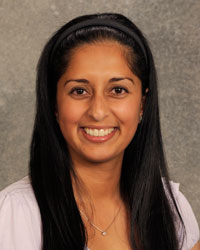 |
Lina Patel, PsyD joined the Sie Center for Down Syndrome at Children’s Hospital Colorado as Director of Psychology in November of 2012. She has extensive experience in treatment planning, parent support, diagnostic evaluation, and intervention. As she believes that behavioral challenges arise for many different reasons, she prides herself in coordination of care with community providers, educational supports, medical team members, and caregivers. Additionally, she conducts clinical research to better understand how neurodevelopment impacts behaviors. |
Overview: Click to Listen
Powerpoint Presentation: Click to Download
Additional Handout: Click to Download
Important Notice
The Global Down Syndrome Foundation’s employees and/or volunteers are NOT acting as your medical professional or attorney. Responses you receive via electronic mail, phone, or in any other manner DO NOT create or constitute a doctor-patient or attorney-client relationship between you and the Global Down Syndrome Foundation (Global), or any employee of, or other person associated with, Global.
Information received from Global’s employees or volunteers, or from this website, should NOT be considered a substitute for the advice of a medical professional or lawyer. Globaldownsyndrome.org DOES NOT provide any medical or legal advice. You should consult with your own doctor or lawyer for medical or legal advice. This website is a general service that provides information over the internet. The information contained on this website is general information and should not be construed as medical advice to be applied to any specific factual situations.
GLOBAL Webinars Archive
2023
2023
2022
2021
2019
CPAP, Hearing Aids, & Glasses, Oh My! How to Help my Child & Adult Wear their Medical Equipment
What Families Need to Know: Utilizing the Pediatric Medical Care Guidelines for Down Syndrome
Self-Advocates Win Landmark Federal Funding for Research: Join GLOBAL – Join the Movement
Take A Deep Breath: Lung Infection & Cognition in Down Syndrome
2018
Award-Winning Actor Colin Farrell Goes Above & Beyond for Global
November 3rd, 2019 by Global Down Syndrome Foundation
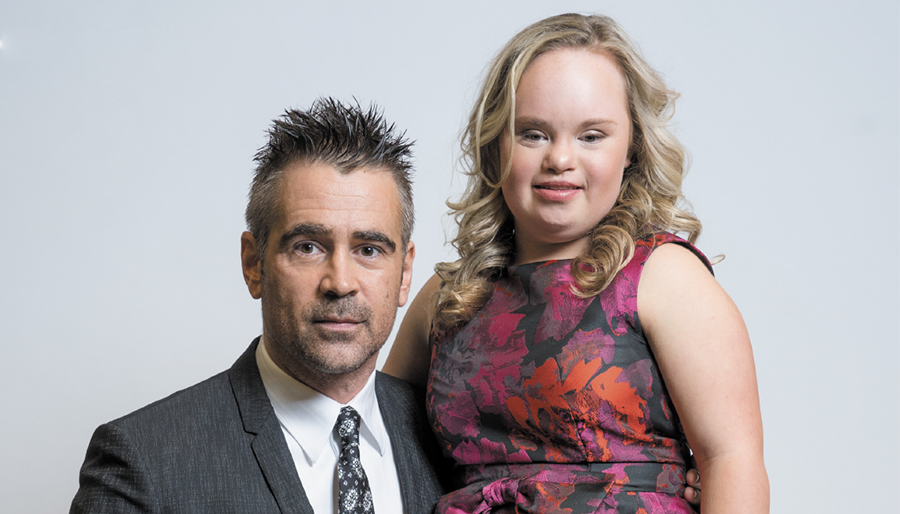
From Down Syndrome WorldTM 2019 Issue 3 of 4
Ensuring 2019 Global Ambassador Charlotte Fonfara-LaRose has a ball at the red carpet premiere of Dumbo
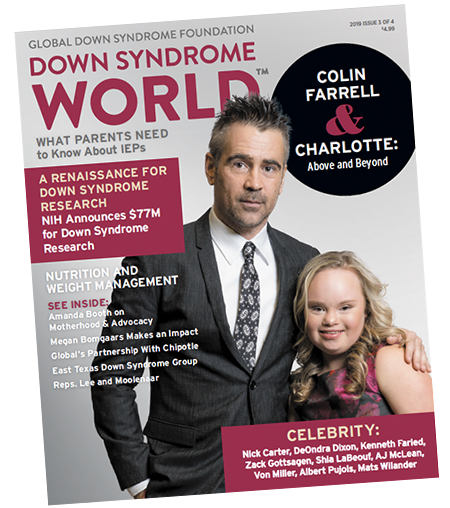 This article was published in the award-winning Down Syndrome World™ magazine. Become a member to read all the articles and get future issues delivered to your door!
This article was published in the award-winning Down Syndrome World™ magazine. Become a member to read all the articles and get future issues delivered to your door! IN MARCH 2019,Charlotte Fonfara-LaRose attended the movie premiere of Tim Burton’s live-action remake of the Disney classic Dumbo as Colin Farrell’s guest. Farrell, who plays circus stalwart Holt Farrier in the film, says, “I was so happy to see Charlotte again at the premiere, and I hope to see her again soon!”
Charlotte assures us the feeling was mutual.
“I felt like a celebrity on the red carpet — he totally remembered who I was and gave me a hug!”
Other cast members in attendance included Michael Keaton, Danny DeVito, Eva Green, and Alan Arkin. As for hanging out with other celebrities on the red carpet like Helen Mirren, Charlotte exclaims, “It was so exciting!”
This amazing opportunity stemmed from Farrell’s generous live auction donation at the Global Down Syndrome Foundation’s 10th Anniversary Be Beautiful Be Yourself Fashion Show in 2018, where Charlotte was a model and Farrell was an awardee. This year, Charlotte has been chosen as the 2019 Global Ambassador where she and her family will be honored at Global’s marquee annual fundraiser.
MEET CHARLOTTE FONFARA-LAROSE
The 16-year-old firecracker was named after her maternal grandmother, Charlotte. Charlotte is a natural activist who loves to help people.
“I help anyone feeling sad feel better by giving them a hug,” she says.
Cathy Fonfara and Scott LaRose had Charlotte in 2003. The young new parents did not learn Charlotte would have Down syndrome until she was born, causing quite a shock. However, both Cathy and Scott come from large dedicated families, who rallied in support of their beautiful new addition to the family.
“Her birth made us want to be better people, and we wanted better for her,” says Cathy. “She is really the reason that we have such a great relationship and that we are a loving family together.”
Scott recalls that his father, who was an engineer and probably knew the least about Down syndrome in the whole group, came to them two days after Charlotte’s diagnosis with a binder of information.
“It was a very touching way to approach things, and I think it certainly helped us dig in a little bit,” Scott tells.
Sixteen years later, the family remains close. The Fonfara and LaRose families have a unique arrangement that works well for them and gives Charlotte lots of quality time with her large extended family.
“Scott and I are no longer a couple, but we are a family and we will always be a family,” says Cathy. “We vacation together, we go out to dinner as a family, and we spend every holiday together as a family.”
Charlotte lives full time with her mom and 8- year-old sister, Noelle, in Annapolis, Maryland. Scott is a ver y attentive father who is involved in every aspect of Charlotte’s life. Charlotte also has special relationships with both her grandmothers: Cathy’s mom, whom she calls “Oma,” and Scott’s mom, whom she calls “ Gigi.”
Charlotte is an inspiration to her family and a role model to her little sister, classmates, and peers. She doesn’t let Down syndrome get in the way of pursuing her dreams, and she lives her life as any typical 16-year-old. She loves horseback riding, swimming, paddleboarding, and traveling. In fact, she’s traveled to over 30 states and 10 countries with her family! She has a boyfriend named Zach, whom she has known since childhood, and they love going on sushi dates. Charlotte has dreams of owning a bagel shop one day, marrying Zach, and living in a blue and red home together.
Charlotte has inspired her mom into action.
“Over the years Charlotte has shown me that all she needs is what all children need: love, support, and encouragement,” says Cathy. “She also has helped me to educate doctors, teachers, and school administrators about the ability and potential of people with Down syndrome.”
GLOBAL’S 2019 AMBASSADOR
This year, Charlotte and her family are thrilled to be named an Ambassador family at the 2019 Be Beautiful Be Yourself Fashion Show. The event is the largest fundraiser for Down syndrome in the world. Over 1,400 self-advocates, families, Hollywood and sports celebrities, community philanthropists, and government leaders attend each year.
Charlotte and her family are no strangers the star-studded evening, though. Cathy and Charlotte were introduced to Global when Zach was in Global’s Washington, D.C. Gala in 2013. Charlotte and Zach danced on the runway together during a performance by Sheryl Crow!
“When we attended our first fashion show, we were astounded by the effort, quality, and attention that Global put into providing such a beautiful and festive event to showcase the beauty of individuals with Down syndrome,” says Cathy.
While she is always impressed by the famous and influential people who come out to support the show every year, Cathy is clear.
“The best part is when the models walk the runway, unintentionally stealing the spotlight from those celebrities escorting them,” she says. “The pride and joy on the models’ faces is indescribable and inspiration is palpable.”
Charlotte and her family have now attended seven Global fashion shows.
COLIN FARRELL’S SPONTANEOUS AND IMPROMPTU GENEROSITY
In 2018, at Global’s 10th Anniversary Be Beautiful Be Yourself Fashion Show, guests went wild for the 25 models with Down syndrome, including Charlotte. They were also brought to their feet by two inspiring recipients of Global’s Quincy Jones Exceptional Advocacy Award — Zack Gottsagen and Colin Farrell.
Farrell is an award-winning Irish actor and activist. He received his first Golden Globe for In Bruges and was nominated for multiple awards for his performance in The Lobster, starring opposite Rachel Weisz. More recently he has star red in the Harry Potter spin-off prequel, Fantastic Beasts and Where to Find Them, The Killing of a Sacred Deer with Nicole Kidman, Roman J. Israel Esq. with Denzel Washington, and the Disney live-action film Dumbo directed by Tim Burton.
Farrell uses his public platform to support organizations he is passionate about. He serves a celebrity partner for the United Nations’ World Food Programme, was an official spokesperson for the Special Olympics World Games in Shanghai, and supports nonprofits focused on the differently-abled community in tribute to his son, James.
As a father to a son with Angelman syndrome, Farrell has supported the Foundation for Angelman Syndrome Therapeutics for over a decade. He credits his son with making his life more meaningful and fulfilling.
“James’ very existence has changed so much about my life and how I preserve my own life selfishly being a caretaker and having the gift of being a protector and a provider for James, and as someone who loves him endlessly, someone who has watched his growth from infant to child to teenager now and approaching his young manhood,” he says. “James’ strength and bravery, his individuality and yet his commonality are things I’m constantly struck by.
“And, of course, as a result of his existence, it has afforded me the great gift of being involved in the lives of other families who care for a child who is differently-abled,” Farrell continues. “I’ve been touched by and allowed to be close to families who share the struggles of just being a par ent first and foremost but also the extra struggles that can arise from being a parent of a child who is differently-abled. James’ enrichment of my life is beyond measure.”
Indeed, James and his work benefiting the differently-abled brought Farrell to Denver last year to receive Global’s highest honor. During the fashion show’s live auction, Farrell jumped up on stage alongside Jamie Foxx, Jeremy Renner, Von Miller, and John C. McGinley and spontaneously offered a trip to Hollywood and tickets to the premiere of Dumbo. Impressed and moved by Farrell’s generosity, Charlotte and her mom decided to bid on the tickets, and they won!
At the fashion show, Farrell took photos with Charlotte and all the models with Down syndrome, and spoke to reporters on the red carpet.
“Seeing all of the members of the community walking down the runway and seeing how much they were empowered, and how the models and every single person in the audience was enraptured, seeing this as an indelible moment and celebration of their lives, and their brilliance as human beings and spirits both individually and as a community, was extraordinarily enriching and also emboldening to observe,” Farrell says.
“What a class act to not only support Global with his presence at the gala but to also offer an ex citing item to raise more money,” says Cathy. “And then be so down to earth and caring to make my sweet Charlotte feel so special.”
FIGHTING DISCRIMINATION AND OVERCOMING CHALLENGES — A REWARDING LIFE
Thousands of guests travel from all over the world to see Global’s iconic fashion show, where models with Down syndrome rock the runway with their celebrity escorts. The evening gives attendees an opportunity to learn, network, and support Global’s work. Through ticket and table purchases, model sponsorships, silent and live auction bids, and general donations, the proceeds from Global’s Be Beautiful Be Yourself Fashion Show benefit their affiliates’ important work in research and medical care.
“The underlying theme of the fashion show is actually human and civil rights, and our event gets to flip an old, negative paradigm on its head,” says Michelle Sie Whitten, President and CEO of Global. “From very active members of the Global community to people who are completely new to Down syndrome, everyone leaves feeling they are a part of something bigger than themselves.”
Charlotte’s family agrees.
“We’ve faced some heartbreaking discrimination in the education system, with teachers creating restrictive learning environments and blatantly excluding kids with special needs,” says Cathy. “One of the many great things that Global does is helping every individual with Down syndrome with education from academia to life skills. They work with parents and their children on their IEPs (individualized education programs), and they are now developing an education center at their new headquarters to focus on vocational training.”
Global aims to show the world that people of all abilities , like Charlotte and James, should have the opportunity to reach their full potential and live happy, rewarding lives.
“Educating our medical professionals and our community is important,” says Farrell. “Imagine you are told your child may never walk and then you see your child take his or her first steps a couple of weeks short of their fourth birthday like James did. The profundity and the emotional magnitude are overwhelming and must be shared with others to educate how y our child’s future is communicated. So there will be great challenges with your child like any child, but the rewards can be unimaginable and even more magnified.”
WORKING HARD TO CREATE HEALTHY LIVES
Global’s Ambassadors and models help raise awareness and advocate for people with Down syndrome to have equal access to transformative research, lifesaving medical care and other opportunities. And who’s at the top of Global ’s contact list for this? The U.S. government. Down syndrome has been one of the least-funded genetic conditions by the National Institutes of Health (NIH) for nearly 20 years, despite being the leading cause of developmental delay in the U.S. and the world.
Angelman syndrome is also a genetic condition. Farrell says that although he was saddened to learn about this disparity in funding, he wasn’t surprised.
“I think maybe the reason for this is a bittersweet one,” Farrell says. “Because people with Down syndrome are often presented as loving and happy, members outside of the community may think there’s no help needed. And it’s our job to teach others that people with Down syndrome need specialized medical care and research and, frankly, help throughout their lives and raise awareness.”
Farrell is optimistic about the progress in research for various genetic conditions “It’s an exciting time in science, and the future is looking brighter for our children than ever before.”
Over a decade of Global lobbying Congress and collaborating with the NIH has resulted in a tripling of the NIH’s Down syndrome research budget, from $27 million in 2016 to $77 million in 2019.
“Through Global, we have come to understand that people with Down syndrome have a different disease profile and that they need specialized medical care throughout their lives,” says Scott. “I was shocked to learn that there are no updated, evidence-based medical care guidelines for adults with Down syndrome. We are hugely grateful to Global and the experts who are working to create those for Charlotte and our community.”
“Global’s amazing work in advocacy, medical care, research, and government legislation will help my daughter and others with Down syndrome be able to live the lives they want and the lives all parents wish for their children,” says Cathy.
“Global’s work is so important because they help find the best treatments for people with Down syndrome who are sick,” Charlotte adds.
The connections between Down syndrome and cancer research are particularly important to the family. In 2016, Charlotte’s friend Mary Miller was diagnosed with leukemia. Charlotte and Mary, both born with Down syndrome, have been friends since appearing as models in Global’s 2014 Be Beautiful Be Yourself Fashion Show. Motivated by Mary’s fight against leukemia and their desire to fund critical Down syndrome research, Cathy and Scott funded a Basic Science Grant to Joaquín Espinosa, Ph.D., and his team at the Linda Crnic Institute for Down Syndrome at the University of Colorado Anschutz Medical Campus. Additionally, Charlotte’s grandmother Gigi has cancer, and as always, the family is supporting her every step of the way.
“Charlotte has a heart of gold and is already a champion for others who are sick or who she feels are disadvantaged in some way,” says Cathy. “She was just born that way, and we can’t wait to see what challenging projects and work she will take on going forward.”
“As a parent, Charlotte is my number one priority,” says Scott. “I want to make sure she receives everything she needs to reach her potential. By supporting Global, we have the luxury of not only helping Charlotte, but helping all people with Down syndrome and that’s an amazing feeling.”
Charlotte will be featured at Global’s Be Beautiful Be Yourself Fashion Show on Saturday, Nov. 2. Farrell encourages everyone to support her.
“I would recommend anyone who gets a chance to support Global and the Be Beautiful Be Yourself Fashion Show in Denver try and make the trip. Charlotte and everyone with Down syndrome deserve your attention. The event itself is love, community, harmony, unity, and unbridled hope for our future.”
“Whether she is being poked and prodded for medical tests, being underestimated by teachers at school, or having people staring at her as she walks down the street, Charlotte has always been brave, resolute, and true to herself. She is truly a great role model and Ambassador.”
Charlotte is excited to apply her strength and passion to her new role with Global.
“As Global’s Ambassador, I hope to help other people with Down syndrome be healthier through medical research, to bring attention to Global’s mission, and to bring respect to people with Down syndrome.”
Like this article? Join Global Down Syndrome Foundation’s Membership program today to receive 4 issues of the quarterly award-winning publication, plus access to 4 seasonal educational Webinar Series, and eligibility to apply for Global’s Employment and Educational Grants.
Register today at downsyndromeworld.org!
Henry Winkler, Laura Linney, Terrell Davis, Shamari & Ronnie Devoe & More Join Forces With Impressive Celebrity Lineup To Support Global Down Syndrome Foundation
October 22nd, 2019 by Global Down Syndrome Foundation
Celebrities vow to raise awareness and funds for life-saving and transformative medical care & research at Global’s Be Beautiful Be Yourself Fashion Show
Top Row (L-R): Quincy Jones, Henry Winkler, Laura Linney, Terrell Davis, Charlotte Fonfarra-LaRose; Bottom Row (L-R): Eric Dane, Shamari and Ronnie Devoe, John C. McGinley, Amanda Booth, Megan Bomgaars
Press Contacts:
Rejena Carmichael | rcarmichael@globaldownsyndrome.org | C: (240) 603-5494
Anca Call | acall@globaldownsyndrome.org | C: (720) 320-3832
Denver, CO (October 22, 2019) – Today the Global Down Syndrome Foundation (Global) announced Emmy Award-winning actor, producer, and director Henry Winkler; Academy Award-nominated and award-winning television and film actress Laura Linney; NFL Hall of Famer Terrell Davis, and R&B royalty and husband-wife dream team Shamari and Ronnie DeVoe will join its celebrity lineup for the 11th annual Be Beautiful Be Yourself Fashion Show at the Sheraton Denver Downtown Hotel, 1550 Court Place, on Saturday, November 2. The marquee event is the largest Down syndrome fundraiser in the world.
Winkler, Linney, Davis, and the DeVoes will join Global in honoring their 2019 Quincy Jones Exceptional Advocacy Award (Q-Award) winners and stars, Amanda Booth and Megan Bomgaars. Both women are passionate advocates for the differently-abled community, and Megan herself has Down syndrome.
Other confirmed celebrities for the Be Beautiful Be Yourself Fashion Show include: music legend and inspiration behind the Q-Award, Quincy Jones; Global board member and award-winning actor John C. McGinley; award-winning actor Eric Dane; Q-Award winner DeOndra Dixon; U.S. Squad World Cup team member and Colorado Rapids player Kellyn Acosta; supermodel and Instagram influencer Mikaela Hoover; 2019 Miss Colorado Monica Thompson; and Denver Broncos cheerleaders Jozie, McKenna, and more.
Twenty-three models with Down syndrome from around the world, traveling from as far as India and London, will rock the runway with celebrity escorts. At the event, Global will also honor the 2019 Be Beautiful Be Yourself Ambassador Charlotte Fonfara-LaRose, while celebrating the return of past Ambassadors and Q-Award winners: DeOndra Dixon and Clarissa Capuano.
For over a decade Global has funded transformative and life-saving research and medical care through its affiliates – the Linda Crnic Institute for Down Syndrome and the Rocky Mountain Alzheimer’s Disease Center both at University of Colorado Anschutz Medical Campus, and the Anna and John J. Sie Center for Down Syndrome at Children’s Hospital Colorado.
Since Down syndrome is one of the least funded genetic conditions by the National Institutes of Health (NIH), Global depends on fundraising events to underwrite important work. This work includes Global’s lobbying Congress and outreach to NIH which has resulted in nearly a tripling of the NIH Down syndrome research budget – from $27 million in 2016 to $77 million in 2019.
“We are excited to share that Global’s unabating and difficult work in Washington, D.C. continues to succeed with the promise of elongating life and dramatically improving health outcomes for people with Down syndrome,” says Global President and CEO, Michelle Sie Whitten. “This wouldn’t be possible without the funds raised at the Be Beautiful Be Yourself Fashion Show and the support of our amazing donors, dedicated Congressional and NIH Champions, passionate self-advocate and families, and our brilliant researchers and medical professionals.”
Various levels of Be Beautiful Be Yourself Fashion Show tickets, table sponsorships, and model sponsorships are available, including VIP levels at www.bebeautifulbeyourself.org.
About Global Down Syndrome Foundation
Established in 2009, Global Down Syndrome Foundation (Global) is a non-profit 501(c)(3) dedicated to significantly improving the lives of people with Down syndrome through research, medical care, education and advocacy. Global is part of a network of affiliates who work together to deliver on our mission, supporting hundreds of scientists and medical care professionals. Our affiliates include the Sie Center for Down Syndrome, the Crnic Institute for Down Syndrome, Rocky Mountain Alzheimer’s Disease Center and a new pilot Adult Clinic. For more information, visit globaldownsyndrome.org and follow us on social media (Facebook, Twitter @GDSFoundation, Instagram @globaldownsyndrome).
Understanding Behavioral Challenges
September 19th, 2019 by Global Down Syndrome Foundation
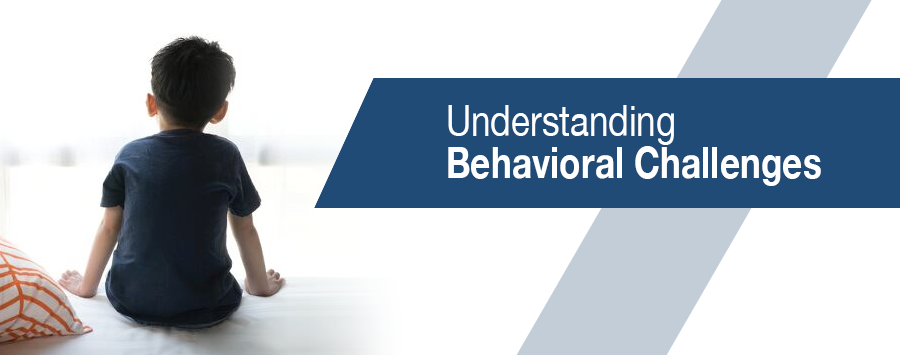
An important study in the journal of mental health research in intellectual disabilities shows that children with Down syndrome demonstrate increased behavioral issues compared with their typical peers. Early intervention and a development strategy can help.
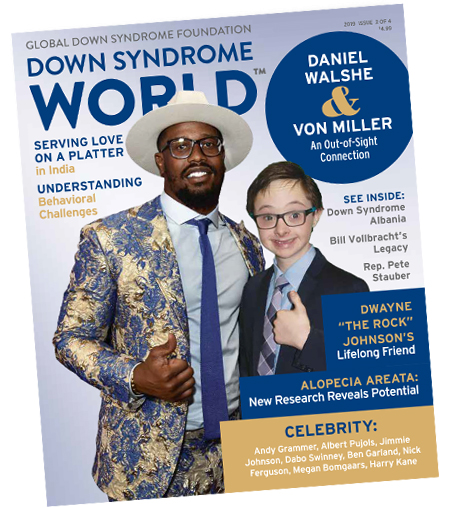 This article was published in the award-winning Down Syndrome World™ magazine. Become a member to read all the articles and get future issues delivered to your door!
This article was published in the award-winning Down Syndrome World™ magazine. Become a member to read all the articles and get future issues delivered to your door! A STUDY CONDUCTED by doctors at the Anna and John J. Sie Center for Down Syndrome at Children’s Hospital Colorado, an affiliate of the Global Down S yndrome Foundation, found that 94% of children with Down syndrome experienced one or more behavioral challenges on a w eekly or even daily basis. These behaviors include wandering off, refusal to follow instructions, aggression, impulsivity, and difficulty transitioning from activity to activity. Behavioral challenges can not only impact a child’ s quality of life but also cause major str esses for parents, teachers, and other caregivers.
In the study, Lina Patel, Psy.D., and her three co-authors, Kristine Wolter-Warmerdam, Noel Leifer, and Francis Hickey, M.D., analyzed current tools for measuring behavior in children with Down syndrome to determine which methods were effective and which could be improved upon. They also surveyed parents to learn about which behaviors were the most common and if any challenges shared a common denominator. The doctors published their results in late 2018.
Children with Down syndrome have many positive behavioral traits, and typical children certainly have negative behavioral issues. However, because of lack of research, behavior issues in children with Down syndrome are less understood. Behavioral challenges can hamper a child’s ability to function independently, perform well in school or other social settings, and even handle everyday tasks, such as bathing and dressing, at home. By understanding what can trigger certain behavioral issues, parents and teachers can better develop strategies to intervene before issues progress.
COMMUNICATION TOOLS: A COMMON DENOMINATOR
A variety of factors may fuel undesirable behaviors, according to Dr. Patel, lead author and D irector of Psychology at the Sie Center.
“I feel like motivation is a key factor,” Dr. Patel says. “It doesn’t mean that children with Down syndrome are unmotivated. It might just mean they are motivated by their own interests versus the task at hand, which then may result in behavioral challenges.”
Dr. Patel and her co-authors wanted to know which behaviors parents of children with Down syndrome found most concerning. They asked parents of 274 children seen at the Sie Center from 2010 to 2015 to fill out a specially designed questionnaire. On the questionnaire, parents were asked to state the frequency with which 16 behavior challenges occurred and their level of concern about each. Parents could also name additional behavioral challenges not listed on the form. The study is one of the largest of its kind and the results were not completely anticipated.
Noncompliance, wandering, sitting down and refusing to move, and aggression were the most common difficult behaviors parents reported. The amount and frequency of challenging behaviors was much higher than previously reported in scientific literature, with nearly 100% of parents noting the existence of challenging behaviors at least weekly.
“The most striking result we found was the frequency of behavioral challenges,” Dr. Patel says. “I think we did capture a wider array of behaviors, resulting in a higher percentage of children experiencing those behaviors. The good news is that many of the behavioral challenges that we assessed can be addressed using behavioral strategies that are informed by neurodevelopment.”
Neurodevelopment is the brain’s development of neurological pathways that influence areas including memory, intellectual functioning, attention, and focus.
The researchers also wanted to determine if any of these behavioral challenges shared a common denominator. They found that the inability of a child to effectively communicate his or her wants and needs was associated with many behavioral challenges.
“Behavior is a form of communication people use when they do not have access to other methods of communication, like verbal communication,” Dr. Patel explains. “Therefore, it’s not surprising that individuals with Down syndrome would have more behavioral challenges if they do not have more functional communication strategies.”
TAKE ACTION EARLY
The longer parents allow unwanted behaviors to persist, the more ingrained these behaviors may become.
“Behavioral interventions can make a difference and really change behavior,” says Elise Sannar, M.D., Assistant Professor of Child and Adolescent Psychiatry at Children’s Hospital Colorado. “If [parents] just live with [a behavior], it’s definitely not going to get better. If kids with Down syndrome learn that if they have a tantrum or refuse to move, they’ll get what they want, that will be reinforced, and they’ll continue to engage in that behavior.”
When concerning behaviors arise, parents should notify their child’s pediatrician or primary care physician as soon as possible so medical causes can be ruled out. Many behavior issues can be triggered by medical ailments to which children with Down syndrome are more predisposed. One such medical ailment is obstructive sleep apnea, which is found in up to 70% of children with Down syndrome.
In addition, parents should pay attention to the context of behavioral challenges — when, where, and with whom they occur, and what happens before and after them, says Anna Esbensen, Ph.D., Associate Professor, Research Director at the Jane and Richard Thomas Center for Down Syndrome in the Division of Developmental and Behavioral Pediatrics at Cincinnati Children’s Hospital Medical Center.
These clues can provide important information about why behaviors occur. Parents who are concerned about a behavior that happened when they weren’t around can ask their child’s friends, teacher, or employer for information about what took place.
“Teaching the child a replacement behavior or a different way of achieving or communicating their needs are helpful ways of teaching an adaptive … method of achieving their desired function,” Dr. Esbensen explains.
She continues, “Once we understand the function of the child’s behaviors, there are evidence-based strategies that can be used to modify that behavioral challenge.”
According to Dr. Sannar, one such strategy is applied behavior analysis (ABA), which uses a variety of techniques, such as positive reinforcement, to increase helpful behaviors and decrease damaging ones. ABA can be effective in children with Down syndrome, autism, and other conditions associated with behavioral challenges.
For example, Dr. Patel says, ABA can be used to stop a child with Down syndrome from running or wandering away from caregivers, also called elopement. A behavioral analyst can collect data to better understand why the child is eloping — is he or she bored, trying to avoid a difficult task that is hard, or eager for attention? Once the analyst has an answer, he or she can create a plan to address it. For example, if the child is avoiding work that feels too hard, the analyst can slowly increase a task’s difficulty or teach the child to ask for a break.
Helping people with Down syndrome manage behaviors is important, not only for their success in school and social situations but also as they enter adulthood, says Dr. Patel.
“Many individuals with Down syndrome who have the skill to seek employment may not be able to if they have behaviors that interfere with their job,” she advises. “It may be more difficult to gain independence with things like staying home alone or even living with others if these behaviors are not addressed.”
While it is more difficult to change longingrained behaviors, therapies and strategies exist that help adults, and studies are starting to address this older population.
The researchers plan to develop a more comprehensive tool to capture the full range of behavioral health challenges that children
with Down syndrome experience. They hope such a tool would help pediatricians and other community providers determine when to refer children to a behavioral health specialist. Most importantly, by understanding and analyzing. these behaviors, they hope to empower both individuals with Down syndrome and their parents to take necessary actions to improve and maintain appropriate behaviors.
Like this article? Join Global Down Syndrome Foundation’s Membership program today to receive 4 issues of the quarterly award-winning publication, plus access to 4 seasonal educational Webinar Series, and eligibility to apply for Global’s Employment and Educational Grants.
Register today at downsyndromeworld.org!
Navigating a Dual Diagnosis of Down Syndrome and Autism
September 4th, 2019 by Global Down Syndrome Foundation
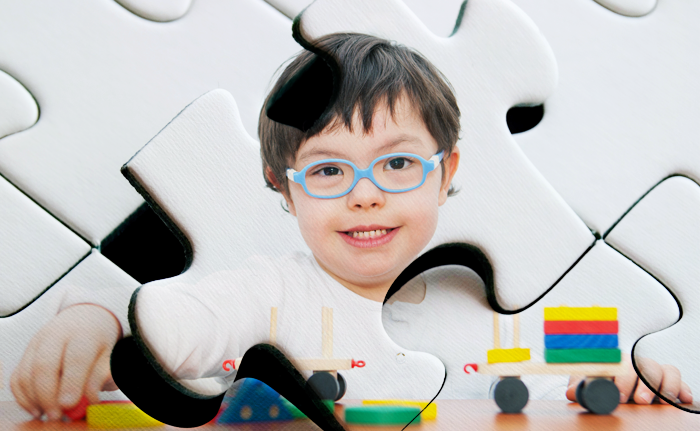
Finding out your child with Down syndrome has co-occurring Autism Spectrum Disorder (DS-ASD) can be daunting, but a better understanding of DS-ASD opens doors to resources and support that benefit children and families alike.
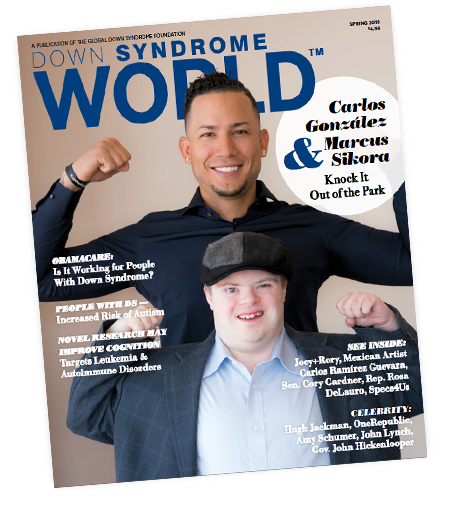 This article was published in the award-winning Down Syndrome World™ magazine. Become a member to read all the articles and get future issues delivered to your door!
This article was published in the award-winning Down Syndrome World™ magazine. Become a member to read all the articles and get future issues delivered to your door! ACCORDING TO THE American Psychiatric Association, ASD is a complex developmental disorder that can cause problems with thinking, feeling, language, and the ability to relate to others. Symptoms occur on a spectrum ranging from mild to severe, and are characterized by challenges in social interaction, verbal and nonverbal communication, and repetitive behaviors.
Current research suggests between 8 and 18 percent of individuals with Down syndrome may also have autism. According to Sarah Hartway, R.N., M.S., President of the Board of Directors of The Down Syndrome-Autism Connection™, an additional 25 percent of people with Down syndrome may exhibit some autism symptoms but not with enough prevalence or severity to be diagnosed with DS-ASD.
“We know autism occurs more frequently in people who have other genetic or chromosomal anomalies,” Hartway said. “So it’s not surprising that people who have Down syndrome are more likely to have autism than the general population.”
SPOTTING THE SIGNS OF AUSTISM
“All children, at any given time, can exhibit behaviors that are consistent with autism, but a child with DS -ASD may engage in them more frequently or find them to be more problematic,” said Robin Zaborek, who also sits on The Down Syndrome-Autism Connection Board of Directors. “Number, frequency, and intensity of behaviors may be distinguishing factors in evaluating for DS-ASD.”
According to Zaborek, children with DS-ASD may engage in the following behaviors:
- Unusual vocalizations
- Repetitive motions, such as rocking or clapping
- Persistent, pronounced need for structure and routine
- Disinterest in playing with others
- Inappropriate laughing or crying
- Repetitive playing with an object, such as a wooden spoon
In some cases, children with DS-ASD may engage in dangerous behavior, such as running away, self-injury, or aggression. They may struggle to reach developmental milestones and have problems with eating, sleeping, and toilet training. They’re also more likely to have certain medical and behavioral conditions, including gastrointestinal issues, seizures, anxiety, and attention-deficit/hyperactivity disorder.
Fortunately, there are resources and ongoing research for people with ASD that will also benefit people with the dual diagnosis. But diagnosing DS-ASD can be a challenge. “Not all medical professionals are aware Down syndrome and autism can co-occur,”
“Not all medical professionals are aware Down syndrome and autism can co-occur,” said Margaret Froehlke, R.N., B.S.N., Secretary of the Board of Directors at The Down Syndrome-Autism Connection. “If families have a Down syndrome clinic in their community, the clinicians there would be better able to make a dual diagnosis because they have the appropriate background.”
Examples of such clinics include the Anna and John J. Sie Center for Down Syndrome at Children’s Hospital Colorado and the Thomas Center for Down Syndrome Services at the Cincinnati Children’s Hospital Medical Center.
Beyond such specialty Down syndrome clinics, Froehlke recommends parents visit a facility that belongs to the network of University Centers for Excellence in Developmental Disabilities, listed at aucd.org.
THE BENEFIT OF KNOWING
Parents of children with undiagnosed DS-ASD can feel very isolated, Froehlke said. They may look at how their child interacts with his or her peers with Down syndrome, and when their child isn’t developing in the same ways or at the same pace, they may pull away from their friends in the Down syndrome community.
“For me and many other parents, getting a dual diagnosis actually leads to relief and validation, because now you understand why your child is different,” she said. “You can begin to seek out the treatments, support, and interventions available to you.”
“There is a compassionate community of professionals and families out there who truly understand the DS-ASD journey is different,” Hartway added. “No one has to walk this path alone.”
Like this article? Join Global Down Syndrome Foundation’s Membership program today to receive 4 issues of the quarterly award-winning publication, plus access to 4 seasonal educational Webinar Series, and eligibility to apply for Global’s Employment and Educational Grants.
Register today at downsyndromeworld.org!
UK’s National Health Service Denies Fundamental Medical Care to Girl with Down Syndrome
August 21st, 2019 by Global Down Syndrome Foundation
Global is outraged!
Macy Lace, a nine-year-old girl with Down syndrome who is immobile, has been denied a walking frame from the National Health Service (NHS) in the UK. This denial left Macy unable to do physiotherapy for 18 months after intensive hip surgery, which her mother says reverses any progress she had been making to walk.
Macy was able to obtain a walking frame a local education service, but it can only be used during school hours. Her doctors say that if she uses her walking frame at home and at school, she can quickly develop the strength to walk.
Global Down Syndrome Foundation works hard every day to ensure Down syndrome research gets its share of funding for our children and adults to receive proper medical care. Discrimination against one person with Down syndrome is discrimination against all people with Down syndrome.
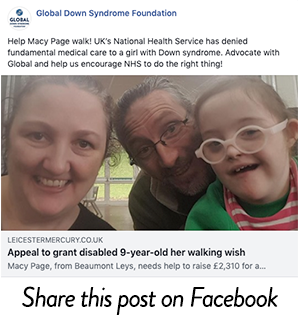 |
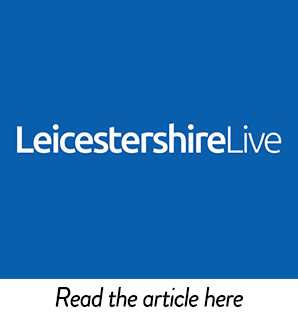 |
Global Recap of 2019 NDSC Annual Convention in Pittsburgh
June 29th, 2019 by Global Down Syndrome Foundation
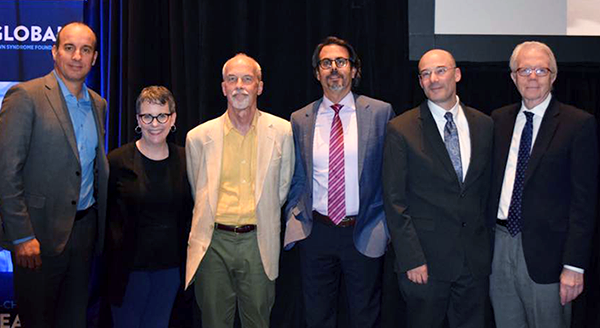
Left to right: Dr. Joaquín Espinosa, Dr. Laurie Ryan, Dr. Dennis McGuire, Dr. Mike Rafii, Dr. Peter Bulova, and Dr. Huntington Potter
Engaging Roundtable Discussion
During Global’s Roundtable, speakers talked about the importance, the issues and the milestones in research and medical care for people with Down syndrome. No seats left in the house!
Speakers included: Quincy Jones Award Recipient Megan Bomgaars, and Global scientists & clinicians Dr. Mike Rafii, Dr. Laurie Ryan, Dr. Huntington Potter, Dr. Joaquín Espinosa, Dr. Peter Bulova, and Dr. Dennis McGuire.
Global’s 2019 NDSC Research & Medical Care Roundtable Recap
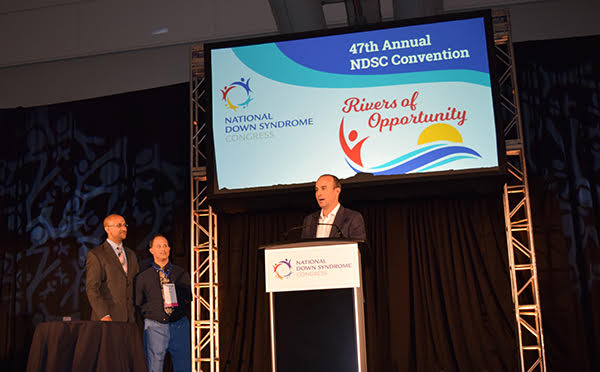
Left to right: Dr. Vellody and his brother Das present Dr. Joaquin Espinosa with 2019 President’s Award
Global Receives Prestigious President’s Award
The Global Down Syndrome Foundation was honored to accept the prestigious President’s Award at the 2019 NDSC Annual Convention. Presented at the Annual Convention Opening Session, Global was awarded for their dedication to Down syndrome research, their unprecedented advocacy work, and their tremendous positive impact on the Down syndrome community. Global’s longstanding relationship with the National Down Syndrome Congress will continue to flourish and together, they will work to improve the lives of individuals with Down syndrome.
Patricia Winders Honored
The Sie Center for Down Syndrome’s Director of Therapies & Senior Physical Therapist, Pat Winders, won an award for her poster on motor development for children with Down syndrome at the Down Syndrome Medical Interest Group Conference held in in Pittsburgh.

Left to right: Dr. Mike Rafii, Dr. Jaoquin Espinosa, Dr. Huntington Potter, and Dr. Laurie Ryan
Captivating Workshops
Global scientists, clinicians, Down syndrome experts, and self-advocates presented thoughtful workshops on everything from aging in adults with Down syndrome and Alzheimer’s to teaching motor skills to advocacy training and more.
An Unprecedented and Exciting Down Syndrome Research Discovery Engine – The Crnic Institute Human Trisome Project
Dr. Joaquín Espinosa, PhD
How to Teach Your Child Gross Motor Skills – Birth to Walking
Patricia Winders
Promoting Strengths and Adaptive Resources in Persons with Down Syndrome
Dr. Dennis McGuire, LCSW, PhD
How to Teach Your Child Gross Motor Skills – Post-Walking Skills
Patricia Winders
Alzheimer’s Disease and Down Syndrome
Dr. Huntington Potter, PhD
CPAP, Hearing Aids, & Glasses, Oh my! How to Help my Child Wear Their Medical Equipment
Dr. Lina Patel, PsyD
Making the Most of a Behavioral Health Consultation for Adults with Down Syndrome
Dr. Dennis McGuire, LCSW, PhD and Bryn Gelaro, LSW
Educational Grants Announcement
Research & Medical Care Roundtable
For more information on any of our workshops or speakers, contact events@globaldownsyndrome.org
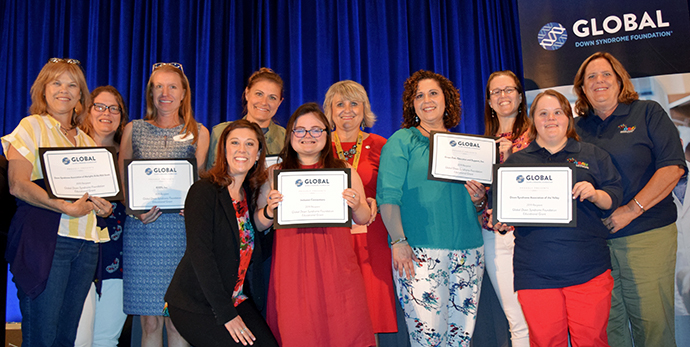
Pay it Forward – Educational Grants to 12 Down Syndrome Organizations
In 2019, Global awarded $75,000 to twelve of its member organizations, bringing the total given through its Educational Grants program to over $625K. Since 2012, Global has awarded grants to 72 innovative educational programs developed by local, national and international Down syndrome organizations.
The Peanut Butter Falcon: A Must-See Indie Film Starring Zack Gottsagen
May 19th, 2019 by Global Down Syndrome Foundation
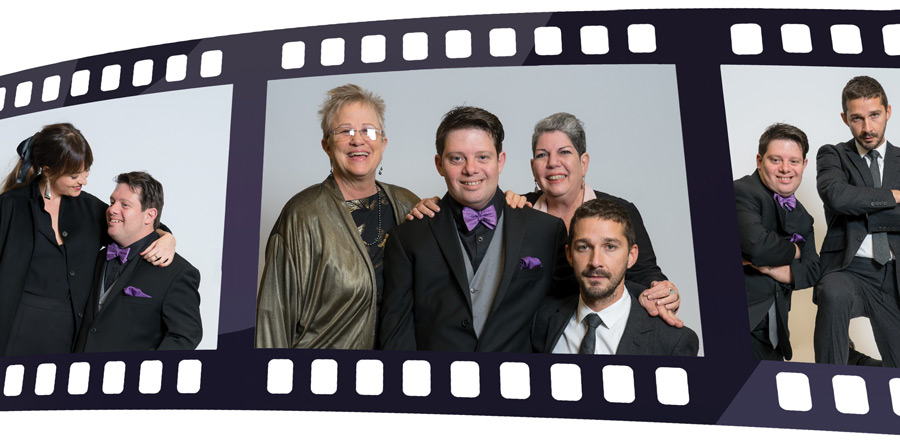
Featured: Dakota Johnson, Zack Gottsagen, and his mothers, Shelley and Trish, and Shia LaBeouf at Global’s Be Beautiful Be Yourself Fashion Show. Photos: Jared Wilson
From Down Syndrome WorldTM Issue 1 2019
Film wins Audience Award at the prestigious South By Southwest (SXSW) Film Festival, and audiences fall in love with Global Down Syndrome Foundation’s Q-Award winner. The key to the movie’s success? Friendship.
ZACK GOTTSAGEN IS NO STRANGER to the spotlight — in fact, he dances right into it. Last year, Gottsagen received the Global Down Syndrome Foundation Quincy Jones Exceptional Advocacy Award. After giving a powerful acceptance speech, he literally threw off his jacket and unexpectedly danced down the runway, charming a crowd of over 1,400 guests at Global’s 10th Anniversary Be Beautiful Be Yourself Fashion Show.
The accomplished actor, who is 33 years old and happens to have Down syndrome, stars alongside Shia LaBeouf and Dakota Johnson in a new feature-length indie film called The Peanut Butter Falcon. Gottsagen’s breakout role and the film were praised by Variety magazine’s review: “… there’s something so guileless and genuine about Zak (qualities that stem directly from the actor playing him) that he manages to win over both his newfound friend and the audience in the same coup.”
The review goes on to focus on the relationship between LaBeouf’s and Gottsagen’s characters. “… Both [their acting] approaches result in a kind of spontaneous unpredictability, making the characters’ choices feel constantly surprising.” Definitely two thumbs-up!
The Peanut Butter Falcon tells the story of a young man with Down syndrome, Zak (Gottsagen), who escapes from the nursing home where he pines to follow his dream of becoming a professional wrestler. Along the way, he meets Tyler (LaBeouf), a troubled traveler with a mysterious past, and Eleanor (Johnson) who is sent from the nursing home with orders to return Zak to the facility. The film also includes award-winning actors Thomas Haden Church, who plays a retired wrestler, and Bruce Dern, Zak’s roommate who helps him escape from the nursing home.
In March, Gottsagen and LaBeouf promoted the film together at the prestigious SXSW Film Festival in Austin, Texas, where The Peanut Butter Falcon won the “Narrative Spotlight” Audience Award.
The filmmakers are hoping to land a distribution deal and release by summer of 2019.
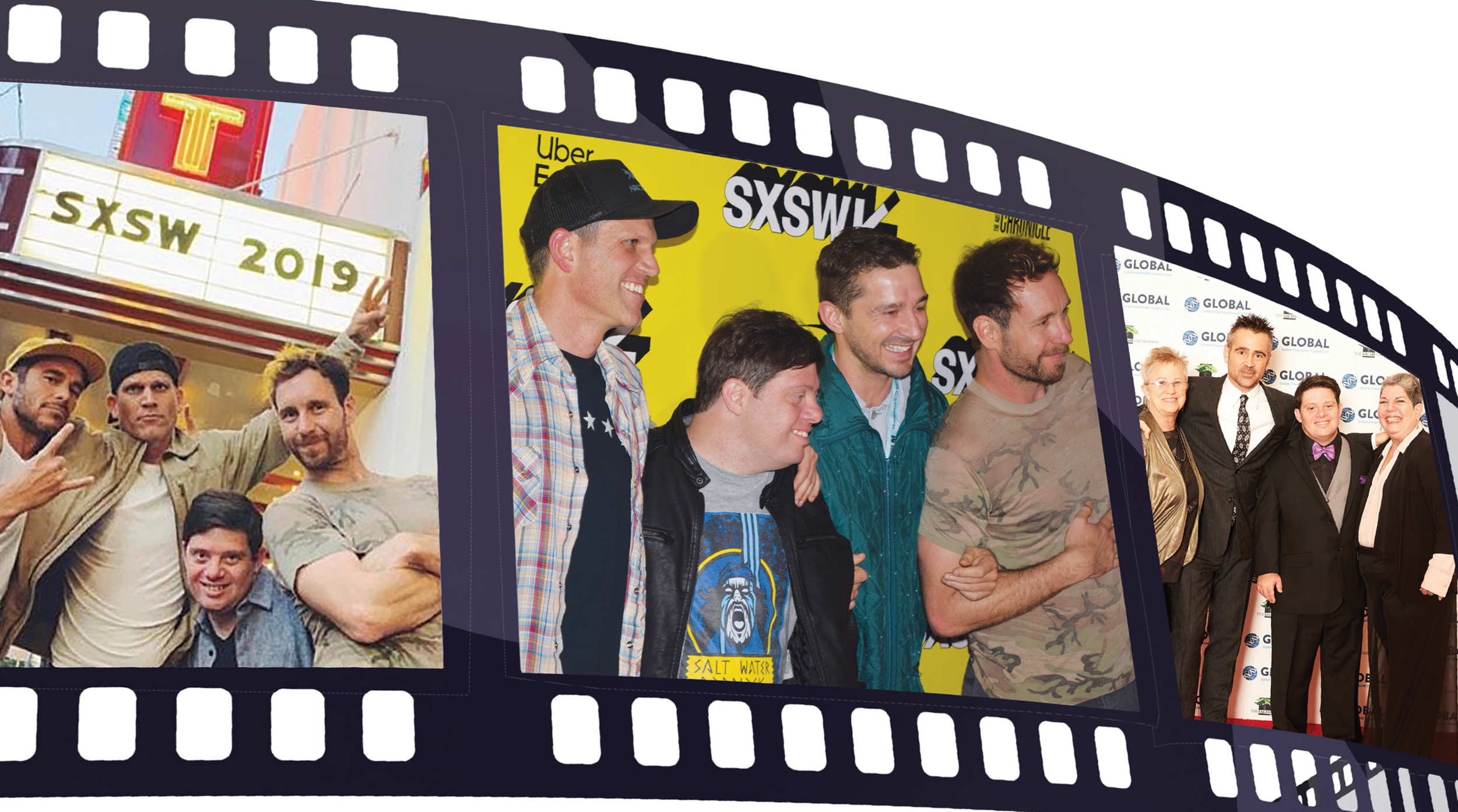
The Peanut Butter Falcon crew at the 2019 SXSW Film Festival. Global’s Q-Award winners Colin Farrell and Zack Gottsagen strike a pose with Gottsagen’s moms, Shelley and Trish.
DESTINED TO BE AN ACTOR
Gottsagen was born with an irresistible charm and drive to change the world. Just ask his mom Shelley Gottsagen.
“Zack has this ability to connect with people from all walks of life,” she says. “He has a real compassion and love for people.”
He was also born with the rare vigor and determination necessary to succeed in the entertainment business.
“Zack tells everyone he meets about his passion for acting , which landed him a lead role in a feature film,” she adds.
“I have wanted to be an actor since I was 3 years old,” Zack says. “I want to show people that no matter who you are, if you follow your heart, you can do whatever you want with your life.”
It was this charisma and determination that led to Gottsagen being cast as one of the first actors with Down syndrome to star as the lead in a full-length feature film. Co-writers and directors, Tyler Nilson and Michael Schwartz, explained their inspiration to write The Peanut Butter Falcon.
“Zack told Michael and me that we should write a movie for him to star in,” Nilson says. “We thought it was genius!”
Nilson and Schwartz had worked with Gottsagan on other short films at Zeno Mountain Farm, a nonprofit that hosts inclusive camps in Vermont, California, and Florida for people of all abilities . They were taken not only by his acting ability but his uncanny sense of timing and skill at reading others. But how to capture that on screen?
Schwartz continues, “Being friends with Zack for many years, we tried to create the most authentic experience we could for our audience by writing a character that is really tailored to Zack and his strengths.”
Gottsagen’s character in The Peanut Butter Falcon, “Zak,” is consistent with Zack the actor in elements such as his love of wrestling and caring, determined spirit.
The result is truly a must-see movie. Variety likened it to indie great Little Miss Sunshine and blockbuster hit Forrest Gump, calling it “a feel-good niche indie with its priorities in the right place.”
GOTTSAGEN, LABEOUF, & JOHNSON ON-SCREEN CHEMISTRY
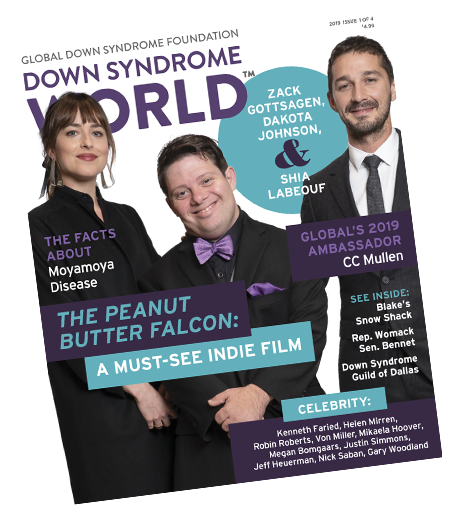 This article was published in the award-winning Down Syndrome World™ magazine. Become a member to read all the articles and get future issues delivered to your door!
This article was published in the award-winning Down Syndrome World™ magazine. Become a member to read all the articles and get future issues delivered to your door! A huge part of any movie’s success is the on-screen chemistry of its actors. The Peanut Butter Falcon has this in spades because the actors became very close while filming. And they have remained close — supporting each other at award ceremonies and keeping in touch frequently through text messages and phone calls.
The bonding happened remarkably fast. Once Nilson and Schwartz finalized the script, the crew had only 30 days to film on the isolated beaches of Savannah, Georgia. Being together every day for a month and working through late hours of the night, the cast truly became a family. Every morning before they started shooting, Gottsagan would give the team a pep talk.
Gottsagen’s mom, Shelley, recalls, “He would call out certain members of the group and thank them for what they did that day. It really gave everyone that extra boost of confidence and created a sense of community.”
For LaBeouf and Gottsagen, their relationship began before the two ever met.
“I saw a video of Zack and thought it would be incredible to work with him. I fell in love with him before I even met him,” LaBeouf explains.
LaBeouf, Johnson, and Gottsagen would eat lunch together every day during filming. Gottsagen consistently ate only chicken. Johnson even named her rescue cat “Chicken” because she said it would make her think of Gottsagan when she was home. While LaBeouf and Gottsagen would watch wrestling together every Monday and Tuesday, Johnson would get mani/pedis with Gottsagen once a week.
“When I met Zack just before we started filming The Peanut Butter Falcon, I was totally bewildered by his purity of heart,” Johnson explains. “He is extremely intelligent, kind, charming, hilarious, and deeply empathetic. He’s the most loving and embracing person I’ve ever met in my life.”
IMPROV GOLD
It was important to the film’s stylistic integrity to keep everything as realistic as possible.
“Zack insisted that he do all of his own stunts,” Shelley recalls. “I couldn’t believe that he jumped off the wooden bridge into the water or that he grabbed a fish with his bare hand! But he wanted it to be real.” She explained how this process wouldn’t have been possible without Nilson and Schwartz’s imaginative vision.
“They allowed Zack to have creative control with his scenes, which really made a difference in bringing his character to life.”
“Often, what Zack and Shia came up with was even better than what was on the page,” Nilson says. “Some of the funniest lines and bits in the film, I have to admit, actually come from Zack’s improv!”
Schwartz adds, “With Zack and Shia, we created a space for them to actually live the scenes.”
LaBeouf confirms how special the interaction was. “When Zack and I met, we would just start riffing with each other [while filming],” he says. “Everywhere it went, we’d wind up with gold. We had really deep conversations that I could only have with Zack.”
Gottsagen agrees. “We practiced our lines, but we were able to make it real, and that’s what it’s all about.”
During red carpet interviews at SXSW, the whole cast and crew spoke to the understanding, patience, and appreciation they developed for people with Down syndrome by working with and learning from Gottsagen.
Schwartz summed it up. “There’s a magic that Zack brings to every scene. With him, he’s not just saying his lines, he’s actually feeling the moment.”
AN IMPORTANT ROLE MODEL, AN IMPORTANT FILM
Gottsagen caught Global’s attention when a Global Ambassador, Chase Turner Perry, identified a family connection to a producer of The Peanut Butter Falcon.
“We were actually a little nervous as we can’t support a film, even a great film, if the messaging is counter to our advocacy work,” says Michelle Sie Whitten, President and CEO of Global. “So we organized a screening in Denver last May, and I was blown away by how excellent the film is, how it pulls you in, and how the film makes important societal statements that the Down syndrome community would be proud of.”
After spending a good amount of time with Gottsagen, Whitten and her team made the decision to honor Gottsagen with Global’s 2018 Quincy Jones Exceptional Advocacy Award at their 10th Anniversary Be Beautiful Be Yourself Fashion Show, the largest fundraiser for people with Down syndrome in the world.
“Zack is a role model and inspiration not just for people with Down syndrome, but for all of us,” says Whitten.
To Whitten’s surprise, The Peanut Butter Falcon family immediately rallied, and LaBeouf, Johnson, Nilson, Schwartz, and other crew members descended upon Denver to support Gottsagen. LaBeouf and Johnson both introduced Gottsagen and helped bestow the Global award.
Now Global is part of the family supporting Gottsagen and traveled to Austin to cover him and The Peanut Butter Falcon at SXSW. Johnson was not able to attend but sent her best wishes to Gottsagen via text. LaBeouf and Gottsagen walked the red carpet together, laughing, joking, and posing for photos.
During the screening, the audience laughed and cried. When the credits started to roll, there was a standing ovation. At the end of the Q&A that followed, Gottsagen took the microphone.
“I make Shia’s life better every day,” he told the SXSW audience. LaBeouf laughed and nodded in agreement. The sincere and unique friendship, both on and off the screen, is undeniable.
Like this article? Join Global Down Syndrome Foundation’s Membership program today to receive 4 issues of the quarterly award-winning publication, plus access to 4 seasonal educational Webinar Series, and eligibility to apply for Global’s Employment and Educational Grants.
Register today at downsyndromeworld.org!
Global Thanks Congress, President and the White House for Maintaining Special Olympics Funding
April 2nd, 2019 by Global Down Syndrome Foundation

At Global, we were shocked about the suggestions to cut the already scarce funding for students with special needs (12% of our students BTW!) and to completely defund Special Olympics. This past week, we saw our congressional heroes fiercely support maintaining funding, including leadership from both sides of the aisle – Congresswoman Rosa DeLauro (D-CT) and Senator Roy Blunt (R-MO) (both Global’s Q-Award Winners). THANK YOU!
We are pleased that Congress and President Trump heard the concerns of those who are differently-abled and that the government will continue to support the incredible Special Olympics program. PLEASE make sure you also safeguard funding for our students with special need in public school who deserve a chance to learn and reach their potential!

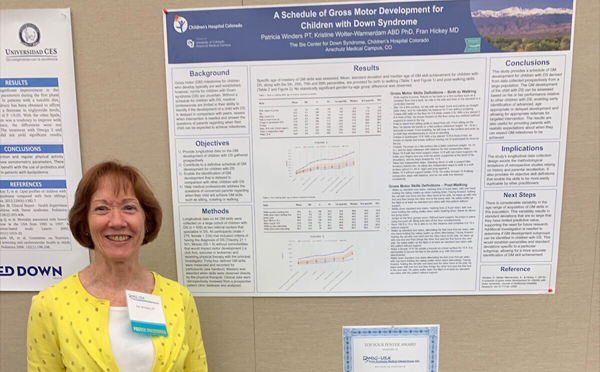
 Experience our inspirational and groundbreaking videos and photos. Our children and self-advocates are beautiful AND brilliant!
Experience our inspirational and groundbreaking videos and photos. Our children and self-advocates are beautiful AND brilliant! Make sure your local Representatives are on the Congressional Down Syndrome Task Force.
Make sure your local Representatives are on the Congressional Down Syndrome Task Force.